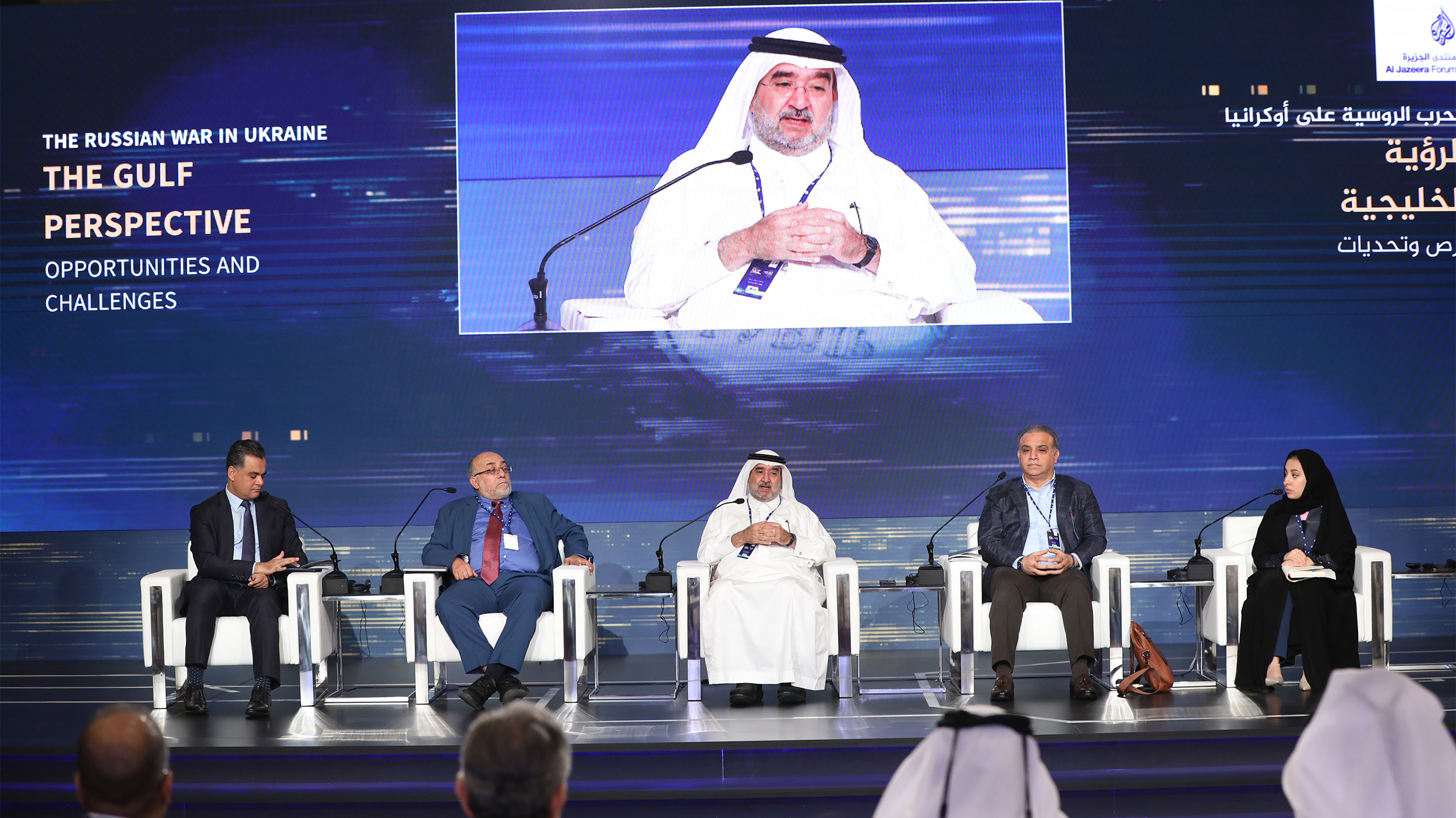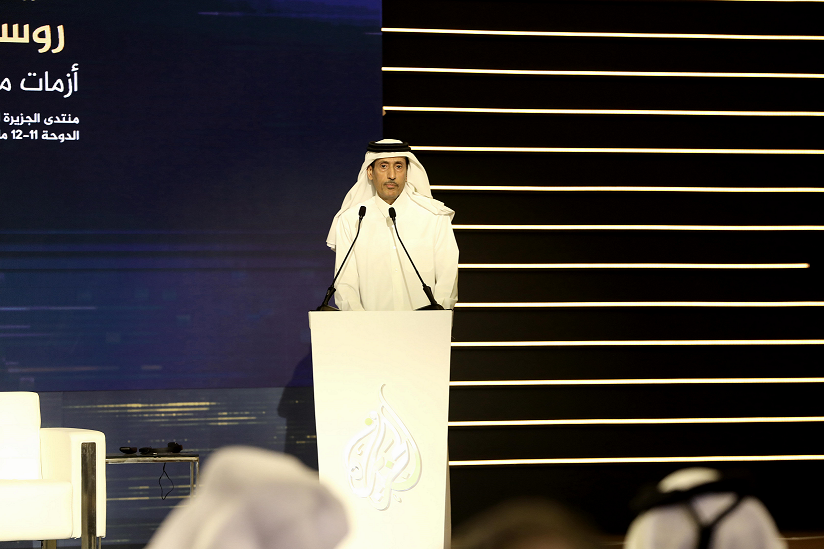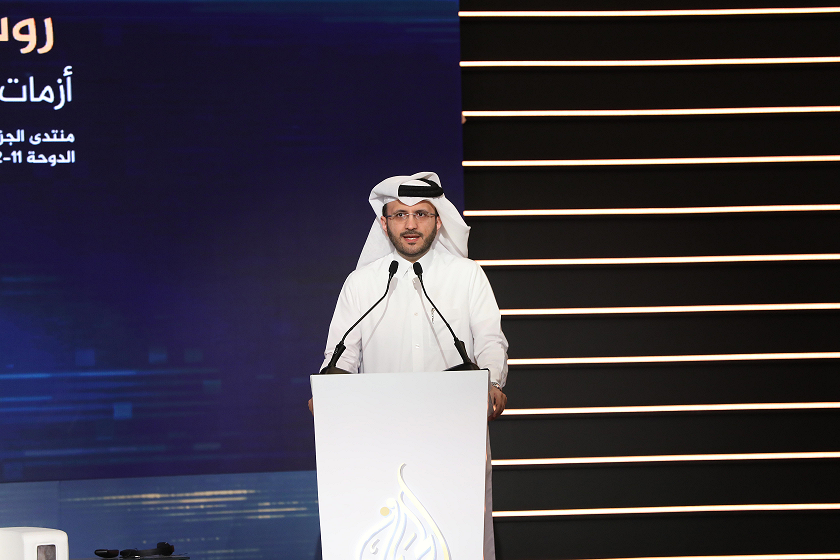
Al Jazeera Media Network held the 14th Al Jazeera Forum on 11 and 12 March 2023 under the title, “The Middle East and the Russian War on Ukraine: Growing Crises and Challenges”, with the participation of a select group of researchers, politicians and experts.
Over six sessions, the forum discussed the direct and indirect implications of the Russian-Ukrainian war on both the parties to the conflict as well as others who were affected negatively or positively. Within this context, the participants presented their readings of the map of the distribution of powers in the world a year into the war.

Shaikh Hamad bin Thamer: The implications of the war befell the whole world
Shaikh Hamad bin Thamer Al Thani, Chairman of Board of Directors of Al Jazeera Media Network, inaugurated the forum and expressed in his speech the importance of its theme, especially considering the implications of the Russian-Ukrainian war befell countries in the region and led to an increase in food prices, the influx of refugees and the escalation of the energy crisis, and cast a shadow on international relations. He also referred to the opportunities the war has created for energy-exporting countries, and the challenges it has created for energy- and food-importing countries at the same time.
On the other hand, Shaikh Hamad bin Thamer emphasised the importance of the Saudi-Iranian rapprochement that was announced recently, maintaining that “it is important that this topic be discussed in-depth in the 14th Al Jazeera Forum.”
Shaikh Hamad concluded his speech by touching on Al Jazeera’s coverage of the war, noting its commitment to objectivity and impartiality, and its adherence to professional standards that have made its screens and platforms a destination for those looking for accurate information and in-depth analysis.

Majed Al-Ansari: It is in the Gulf’s interest for the war to end peacefully
For his part, Dr. Majid Al-Ansari, Advisor to the Prime Minister and Minister of Foreign Affairs, and Spokesperson for the Qatari Ministry of Foreign Affairs, stressed in his keynote speech the gravity of the Russian-Ukrainian war on world security and the importance of reaching a peaceful solution to the war.
In this context, Al-Ansari said that since the beginning of the crisis, Qatar has emphasised the importance of finding a peaceful solution and de-escalation, as it realises the significance of the matter for Europe and the world. He added that Qatar has taken upon itself to fulfil its obligations towards global energy security, especially with regard to gas.
Al-Ansari concluded his speech by pointing out the need for the international community to consider other crises and issues that are no less serious than the Ukrainian crisis, such as the Palestinian struggle and the importance of finding a fair and peaceful settlement that restores the legitimate rights of the Palestinian people.
A summary of the sessions
After the two opening speeches, the forum’s sessions began, taking place over the course of two days. Participating in them were researchers and experts of different nationalities, intellectual orientations and political affiliations. They reached a number of conclusions, most notably that the war in Ukraine is a proxy war between Russia and the West; and that it will not change the nature of the global order radically, but may relatively reshape it to become more pluralistic.
In addition, the sessions indicated that, despite the ongoing attrition of both Russia and the West and the growing impact of the war on them both, the West will remain strong and cohesive. This means that if the war drags on, the biggest loser will be Russia.
However, discussions revealed that there are countries that benefited from that war – like the United States, which has strengthened its leadership of the global order; China, which sees the exhaustion of the West as support for its peaceful rise to the leadership of the global order, or at least to an advanced position at the top; and Turkey, whose geopolitical position has improved, especially after the Black Sea Grain Initiative. This also holds true for Iran, whose relations with Russia on the military and economic levels and oil-exporting Gulf countries were strengthened by the war. Notwithstanding, there are many countries in the world negatively affected by the war, especially with the disruption of food supply chains and the rise in energy prices, resulting in currency depreciation and increased debt. This could lead to political and social unrest if the war persists.
For the Gulf states in particular, it is of utmost importance that the war ends and peace and security are restored, the sessions maintained. This is because, despite the rise in energy prices (which benefits them), in the long run, the war will lead to global instability and increasing polarisation among influential powers, which will in turn impact Gulf states negatively. Therefore, the forum concluded, Gulf interests require remaining neutral, avoiding regional and international polarisation, and allocating natural and financial resources according to the interests of Gulf peoples.
One of the sessions addressed the nature of media coverage and the challenges facing field correspondents. These include the lack of safety in conflict zones; merely practicing the profession, potentially triggering parties to the conflict to consider what they present propaganda against them; having to educate themselves while conveying the news and educating viewers; and the long-term psychological effects of witnessing traumatic events during coverage.
In terms of coverage, the session asserted that Al Jazeera’s is characterised by balance, objectivity, professionalism and impartiality as well as courage, initiative and access to the front lines of fire to present an image to the viewer that is as close to reality as possible. This kind of coverage, it explained, necessitates sending experienced journalists to conflict zones, and ensuring their physical and psychological safety during and after coverage.
At the end of the session, it recommended benefitting more from organisations dedicated to human rights and press freedom, such as the International Committee of the Red Cross and the International Press Institute, for the protection of journalists as both media professionals and civilians in conflict zones and wars.
The 14th Al Jazeera Forum was broadcast on Al Jazeera Mubasher and live-streamed on Al Jazeera Forum and Al Jazeera Centre for Studies’ social media platforms. The sessions are available here.